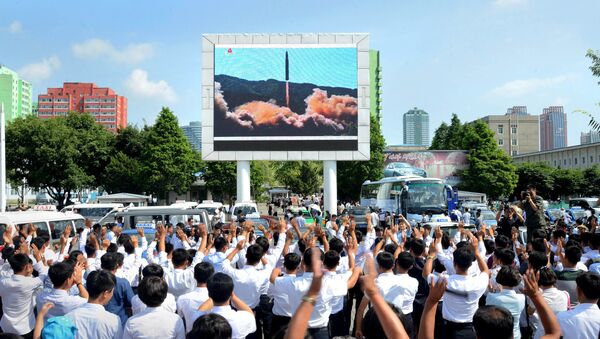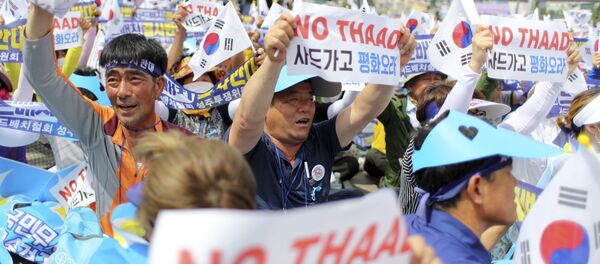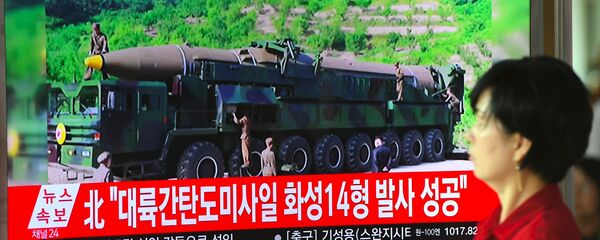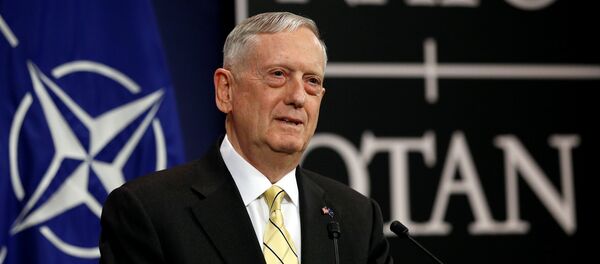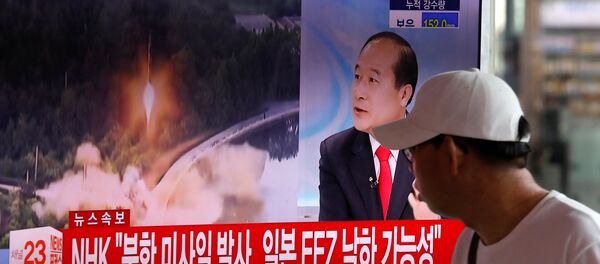The Chinese comments came from Foreign Ministry spokesman Geng Shuang, who stressed for the Americans and North Koreans "to stay calm, exercise restraint, refrain from words and deeds that may heighten tensions, and jointly make effort for the easing of tensions" in a Thursday statement to reporters.
The White House originally made China the centerpiece of their plan to peacefully resolve the Korean missile crisis, but now it seems that US President Donald Trump is moving away from that policy. "Trade between China and North Korea grew almost 40% in the first quarter. So much for China working with us — but we had to give it a try!" the American president tweeted on Wednesday.
Geng replied to Trump's criticism in his comments: "As a neighboring country of the DPRK, China has maintained normal economic relations and trade. According to the DPRK-related resolutions, relevant economic sanctions should not harm the livelihood and normal humanitarian need of the DPRK."
Moon Chung-in, a professor at Yonsei University and a prominent liberal foreign policy scholar who is serving his third South Korean president as a national security advisor, weighed in for South Korea. He told Yonhap that he didn't believe that the North Korean crisis would inevitably result in war and that peace was still a possibility.
"My personal view is that the US State Department and Secretary of State [Rex] Tillerson both came to a conclusion too easily [about North Korea's ICBM capabilities]," he said during a national security summit held in Seoul. "They called it an ICBM and said that the North has secured ICBM capability, but the US appears to have overestimated its capacity."
Moon's comments come in the wake of the latest North Korean missile launch, a ballistic missile that landed in the Sea of Japan. The missile first appeared to be an intermediate-range weapon but a televised statement from Pyongyang claimed that it was a Hwasong-14 ICBM.
Tillerson confirmed North Korea's claims, stating that the missile test had upped the Democratic People's Republic of Korea (DPRK) to a "global threat." "Any country that hosts North Korean guest workers, provides any economic or military benefits, or fails to fully implement UN Security Council resolutions is aiding and abetting a dangerous regime. All nations should publicly demonstrate to North Korea that there are consequences to their pursuit of nuclear weapons," said the former Exxon CEO.
US Ambassador the United Nations Nikki Haley took her comments one step further, claiming that the United States was willing to use military force against the North Koreans as the Hermit Kingdom's continued missile tests were "quickly closing off" chances for a peaceful resolution.
Moon contradicted the statements from the American leadership, saying that there was "no data about whether the missile can withstand the heat when making re-entry to the atmosphere, whether it is possible to control its deceleration and if an actual nuclear warhead can be loaded onto its tip."
"To secure stability in missiles, they have to be tested about 15 times, but there have not been many tests. From a technological point of view, it is hard to say that the North has secured an ICBM capability," Moon added. "This means we still have time."
"The recent test of the Hwasong-14 is not the end of the world. I think we can make a breakthrough and we can figure out a shared alternative through global coordination including consultations with such countries as the US, China and Russia."
Moon concluded his comments by saying that the United States' policy was flawed because they were drawing "red lines" and then becoming angry when the North crossed them. "If we draw the red line and do not punish [when the North crosses it], it could hurt our credibility. If we act, then it could lead to devastating results," he said. "More desirable in international relations is to pursue a multifaceted approach without drawing any such lines."
Moon has been a longtime critic of American policy on the Korean Peninsula. He has always favored diplomacy and a soft hand with North Korea, and was one of the key architects of the "Sunshine Policy" of peaceful co-existence in the late 90s and 2000s. That policy collapsed after then-US President George W. Bush named North Korea as part of a global "Axis of Evil" in 2002.

